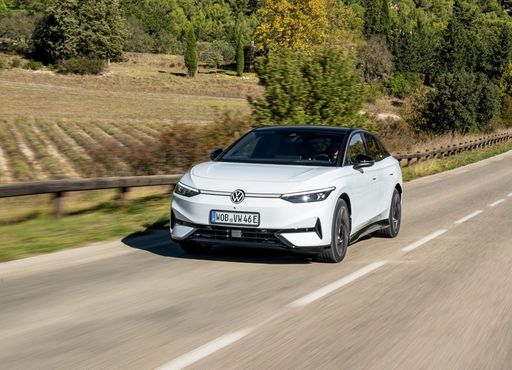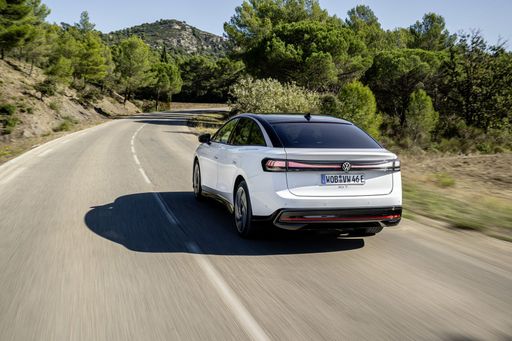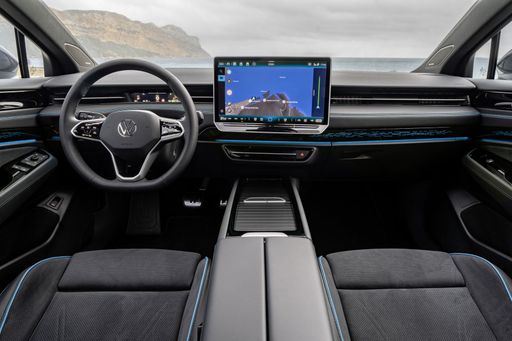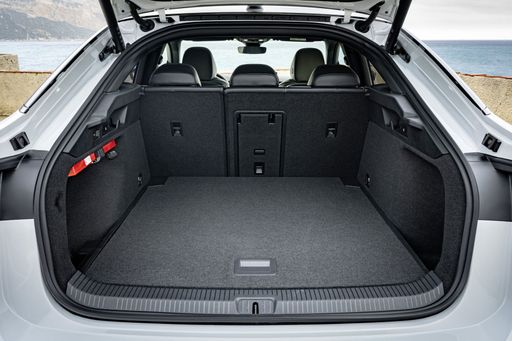Citroen Jumpy Transporter vs VW ID.7 – Differences & prices compared
Compare performance, boot space, consumption and price in one view.
Find out now: which car is the better choice for you – Citroen Jumpy Transporter or VW ID.7?
The Citroen Jumpy Transporter (Cargo Van) comes with a Diesel or Electric engine and Manuel or Automatic transmission. In comparison, the VW ID.7 (Hatchback) features a Electric engine with Automatic transmission.
When it comes to boot capacity, the Citroen Jumpy Transporter offers , while the VW ID.7 provides 532 L – depending on how much space you need. If you’re looking for more power, decide whether the 177 HP of the Citroen Jumpy Transporter or the 340 HP of the VW ID.7 suits your needs better.
In terms of consumption, the values are 23.60 kWh6.60 L per 100 km for the Citroen Jumpy Transporter, and 13.60 kWh for the VW ID.7.
Price-wise, the Citroen Jumpy Transporter starts at 30900 £, while the VW ID.7 is available from 46300 £. Compare all the details and find out which model fits your lifestyle best!
Citroen Jumpy Transporter
The Citroen Jumpy Transporter exemplifies versatility and practicality, making it an ideal choice for both urban and long-distance driving. With its spacious interior and advanced features, it caters to a range of commercial needs while ensuring comfort for the driver. The Jumpy also boasts a contemporary design, reflecting Citroen's commitment to style and functionality.
detailsVW ID.7
The VW ID.7 represents a significant step forward in Volkswagen's electric vehicle lineup, offering an elegant design combined with advanced technology features. This electric saloon showcases a sleek aerodynamic profile, prioritising both performance and efficiency. Inside, drivers will appreciate the spacious and modern cabin, equipped with intuitive controls and connectivity features for a seamless driving experience.
details @ Volkswagen.de
@ Volkswagen.de
 @ Volkswagen.de
@ Volkswagen.de
 @ Volkswagen.de
@ Volkswagen.de
 @ Volkswagen.de
@ Volkswagen.de

|
|
|
|
|
Costs and Consumption |
|
|---|---|
|
Price
30900 - 52000 £
|
Price
46300 - 54100 £
|
|
Consumption L/100km
6.6 - 7.7 L
|
Consumption L/100km
-
|
|
Consumption kWh/100km
23.6 - 24.7 kWh
|
Consumption kWh/100km
13.6 - 16.2 kWh
|
|
Electric Range
222 - 328 km
|
Electric Range
595 - 709 km
|
|
Battery Capacity
-
|
Battery Capacity
77 - 86 kWh
|
|
co2
0 - 203 g/km
|
co2
0 g/km
|
|
Fuel tank capacity
70 L
|
Fuel tank capacity
-
|
Dimensions and Body |
|
|---|---|
|
Body Type
Cargo Van
|
Body Type
Hatchback
|
|
Seats
3 - 6
|
Seats
5
|
|
Doors
4
|
Doors
5
|
|
Curb weight
1722 - 2188 kg
|
Curb weight
2184 - 2328 kg
|
|
Trunk capacity
-
|
Trunk capacity
532 L
|
|
Length
4959 - 5309 mm
|
Length
4961 mm
|
|
Width
1920 mm
|
Width
1862 mm
|
|
Height
1895 - 1935 mm
|
Height
1535 - 1536 mm
|
|
Payload
875 - 1270 kg
|
Payload
456 - 462 kg
|
Engine and Performance |
|
|---|---|
|
Engine Type
Diesel, Electric
|
Engine Type
Electric
|
|
Transmission
Manuel, Automatic
|
Transmission
Automatic
|
|
Transmission Detail
Manual Gearbox, Automatic Gearbox
|
Transmission Detail
-
|
|
Drive Type
Front-Wheel Drive
|
Drive Type
Rear-Wheel Drive, All-Wheel Drive
|
|
Power HP
120 - 177 HP
|
Power HP
286 - 340 HP
|
|
Acceleration 0-100km/h
12.1 - 13.3 s
|
Acceleration 0-100km/h
5.4 - 6.6 s
|
|
Max Speed
130 - 185 km/h
|
Max Speed
180 km/h
|
|
Torque
260 - 400 Nm
|
Torque
545 - 679 Nm
|
|
Number of Cylinders
4
|
Number of Cylinders
-
|
|
Power kW
88 - 130 kW
|
Power kW
210 - 250 kW
|
|
Engine capacity
1499 - 1997 cm3
|
Engine capacity
-
|
General |
|
|---|---|
|
Model Year
2024 - 2025
|
Model Year
2023 - 2024
|
|
CO2 Efficiency Class
G, F, A
|
CO2 Efficiency Class
A
|
|
Brand
Citroen
|
Brand
VW
|
Citroen Jumpy Transporter
The Citroen Jumpy Transporter: A Comprehensive Overview
The Citroen Jumpy Transporter has long been a popular choice for businesses and individuals needing a reliable and versatile vehicle. The 2024 models continue this tradition with a range of options catering to different needs, from traditional diesel engines to innovative electric powertrains. Let's delve into what makes the Citroen Jumpy Transporter a standout in its class.
Power and Performance
The Citroen Jumpy Transporter offers various engine options, starting from a 1.5 BlueHDi with 120 PS all the way to a 2.0 BlueHDi producing 177 PS. For those seeking an environmentally friendly option, the electric e-Jumpy is a game-changer with variants offering up to 136 PS. The electric version offers a range between 222 km and 328 km, depending on the battery configuration.
Diesel options provide flexible performance, with manual and automatic transmissions available, ensuring a smooth and adaptable driving experience. The diesel engines boast a notable fuel efficiency of between 6.6 and 7.7 L/100km, making them a cost-effective choice for long-distance travel.
Efficiency and Environmental Impact
In terms of emissions, the diesel variants range from 172 to 203 g/km in CO2 output. The inclusion of energy-efficient electric models positions Citroen at the forefront of eco-friendly innovations in commercial transport. These electric versions produce zero CO2 emissions, significantly reducing the environmental footprint.
Innovative Features and Design
The design of the Citroen Jumpy Transporter is functional yet stylish, with a length ranging from 4959 mm to 5309 mm, ensuring ample space for cargo without compromising manoeuvrability. Inside, the transporter offers seating for up to six passengers, making it ideal for transporting teams or client visits.
The use of high-quality materials and a well-thought-out internal layout ensure comfort and convenience, whether you're navigating city traffic or cruising on the highway. Optional advanced driver-assistance systems and connectivity capabilities, such as smartphone integration and live navigation services, enhance the driving experience further.
Adaptability and Customisation
Citroen has equipped the Jumpy with multiple configurations to suit various commercial needs. With payload capacities ranging from 898 kg to 1333 kg and a robust build, the transporter can handle a wide array of tasks with ease. The rear cargo area is spacious, accessible, and flexible, perfect for accommodating different types of goods or equipment.
Conclusion: A Transporter for All Needs
In conclusion, the Citroen Jumpy Transporter stands out as a versatile and innovative vehicle, catering to a broad spectrum of professional needs. Whether you require a dependable diesel engine or wish to transition to an eco-friendly electric model, the Jumpy's impressive lineup provides powerful performance, cutting-edge technology, and exceptional efficiency to meet modern demands.
VW ID.7
Introducing the VW ID.7: A Game-Changer in the Electric Car Market
The VW ID.7 represents Volkswagen's commitment to innovation and sustainability in the automotive market. This all-electric vehicle stands out not only for its sleek design but also for its impressive array of technological advancements. In this article, we delve into the technical specifications and innovations that make the ID.7 a remarkable addition to Volkswagen's electric vehicle lineup.
Power and Performance
Under the bonnet, the VW ID.7 is powered by a range of electric motors, offering horsepower between 286 and 340 PS. This provides the perfect blend of power and efficiency, making it an ideal choice for both city driving and long-distance journeys. With a top speed of 180 km/h and a lightning-fast acceleration from 0 to 100 km/h in just 5.4 seconds, the ID.7 doesn’t compromise on performance.
Impressive Range and Efficiency
The VW ID.7 redefines what it means to travel efficiently. Depending on the model, the ID.7 offers an electric range between 595 and 709 km on a single charge, setting new benchmarks for the industry. With energy consumption as low as 13.6 kWh per 100 km, it is one of the most energy-efficient vehicles in its class, making it both environmentally friendly and cost-effective for everyday use. The ID.7 boasts a CO2 efficiency class of A, reflecting its zero-emission status.
Advanced Technology and Safety Features
Volkswagen has equipped the ID.7 with cutting-edge technology designed to enhance the driving experience. The car features advanced driver assistance systems, including adaptive cruise control and lane-keeping assistance. Moreover, its infotainment system is state-of-the-art, offering seamless connectivity and a user-friendly interface. Safety features are also top-notch, ensuring peace of mind for drivers and passengers alike.
Design and Comfort
The ID.7's design is both futuristic and practical. Its streamlined body provides a stylish exterior, while the interior is spacious and comfortable, accommodating up to five passengers effortlessly. With a generous boot capacity of 532 litres, there is plenty of storage for all your needs. The ID.7’s dimensions, measuring 4961 mm in length and 1862 mm in width, make it a substantial vehicle that commands attention on the road.
Efficient Price Point
Despite its high-tech features and impressive performance, the VW ID.7 maintains a competitive price range, starting from €53,995. This makes it accessible to a wide range of customers seeking an eco-friendly vehicle without breaking the bank. Additionally, with monthly costs ranging between €1,197 and €1,372, it's a practical choice for those considering long-term electric vehicle ownership.
Conclusion
In conclusion, the VW ID.7 is a testament to innovation in the electric vehicle sector. Its combination of power, range, and technology sets a new standard for what drivers can expect from an electric car. As Volkswagen continues to pave the way for electric mobility, the ID.7 stands as a beacon of what's possible when cutting-edge technology meets sustainable driving practices.
The prices and data displayed are estimates based on German list prices and may vary by country. This information is not legally binding.
